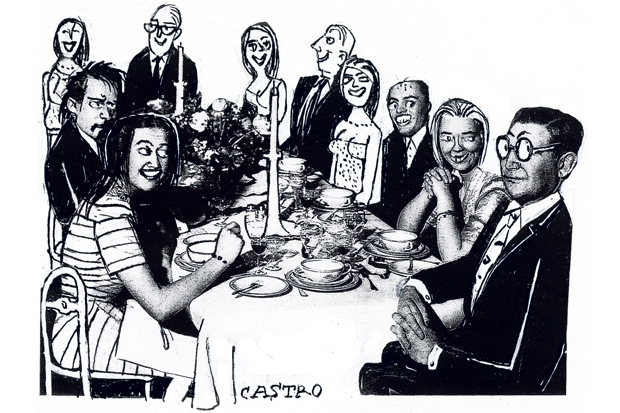Christmas will be a very warm occasion for me. I’ll be spending it with the Massonneaus — my family — as I do every year. It will be five brothers and sisters, gathered around our mother in our childhood home, a council house that, for us, felt like a palace when we first moved in. As always, our mother will try very hard for everything to be perfect, from the meal to the mountains of presents. With 12 grandchildren, who are all at an age to bring around a special someone or a ‘fiancée’, it usually becomes quite boisterous. However, this will also be my first Christmas for a very long time as a single woman and it will be my last Christmas in my forties. In two months, I will cross the threshold of 50. I am preparing myself, getting ready, with a firm resolution to accept my wrinkles. Or not.
The anti-poverty organisation Secours Populaire, which I sponsor, is 20 years older than me. It celebrates its 70th anniversary in 2015. Julien Lauprêtre, who has been its president for more than 50 years, has 80,000 volunteers and one objective: solidarity. With them, there is no charity make-believe, political correctness or fancy language. A poor person is a poor person, not a disadvantaged person. ‘Le Secours pop’ gives out 181 million meals every year and is active in about 50 countries. They also launched a movement called ‘Copain du monde’ which introduces children to each other from across the world. Their greatest success? Bringing together small Israeli and Palestinian children.
My new year’s resolution is — wait for it — to learn English, though I should admit I have broken this promise before. I don’t really know what holds me back. I have, however, learned how to drive, how to send an attached file, and how to switch on a DVD player and a washing machine. The DVD player is essential to my English mission. Since I discovered 24 and Jack Bauer, I have been bingeing on all the episodes, in English. OK, so I do put on the subtitles, but I am nevertheless making progress. During my recent four-day trip to London to promote my book, I probably learned about 12 new words. I now know how to say ‘Oh my God’ and even ‘Thank you for this moment’. I understood what was being said to me (thank God!) and managed to hold a proper conversation with Lord Ashcroft during a private dinner organised by my publisher. I even caught and laughed at some of the subtleties, although the second glass of wine helped with that.
I hope I am wrong, but it seems unlikely that the 219 Nigerian girls who are still missing after being kidnapped by Boko Haram in April will be returned in time to spend Christmas with their families. Some of them have been raped, forced to marry or reduced to slavery. No kidnapping of this magnitude has ever been attempted before (276 girls were taken, some of whom escaped). We all remember Michelle Obama’s banner ‘#BringBackourGirls’. The first lady took a firm and single-minded stand and spoke in the place of her husband to ask for their release. The young girls are the age and colour of her own daughters. Malia and Sasha will have the joy of spending Christmas with their parents, but they and I will think of Esther, Yana, Rébéca, Déborah, Ruth, Salomé, Margret and all the others who have been robbed of their freedom.
I am lucky to receive a number of free books every day as a result of my column in Paris Match. Sadly, I now have too many, and have to spend a lot of time rearranging them. When I was young, I could not imagine separating myself from a book, but nowadays I have to give some away. Many of my books have been following me for 30 years, and some are still in boxes waiting for me to take them out after three consecutive relocations. A few have had their corners chewed by mice. A number of books caught my eye this year, like the one about Eleanor of Aquitaine, Le roi disait que j’étais diable, written by Clara Dupont-Monod, and A Train in Winter, by Caroline Moorehead. The latter prompts one to think of those very drastic images from Claude Lanzmann’s Shoah and the empty trains on their way back from Auschwitz-Birkenau, as well as all the barbaric behaviour around the world. Think of the recent beheadings of hostages by Isis. It’s so difficult to comprehend. Just when you think you have seen the worst of humanity, something even worse comes to light.






Comments